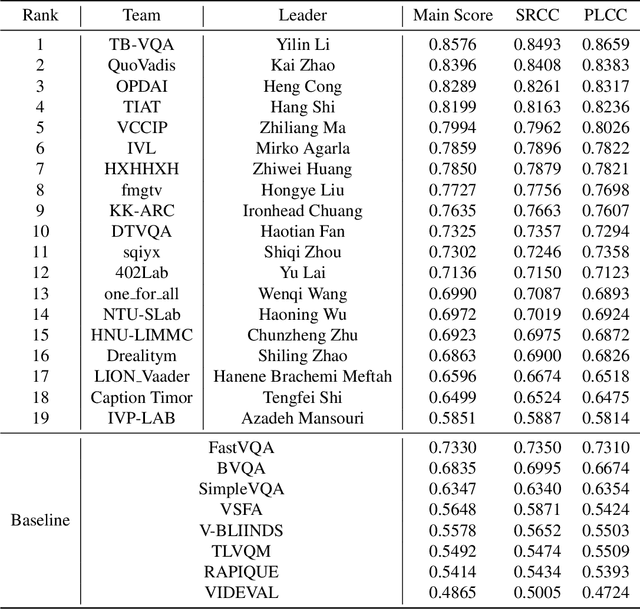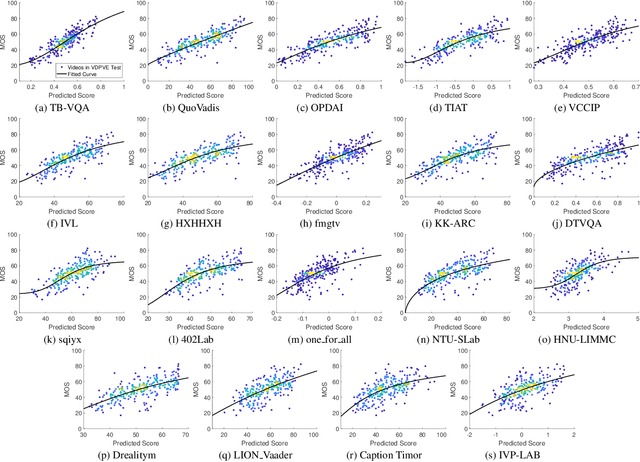Haotian Fan
ViDA-UGC: Detailed Image Quality Analysis via Visual Distortion Assessment for UGC Images
Aug 18, 2025Abstract:Recent advances in Multimodal Large Language Models (MLLMs) have introduced a paradigm shift for Image Quality Assessment (IQA) from unexplainable image quality scoring to explainable IQA, demonstrating practical applications like quality control and optimization guidance. However, current explainable IQA methods not only inadequately use the same distortion criteria to evaluate both User-Generated Content (UGC) and AI-Generated Content (AIGC) images, but also lack detailed quality analysis for monitoring image quality and guiding image restoration. In this study, we establish the first large-scale Visual Distortion Assessment Instruction Tuning Dataset for UGC images, termed ViDA-UGC, which comprises 11K images with fine-grained quality grounding, detailed quality perception, and reasoning quality description data. This dataset is constructed through a distortion-oriented pipeline, which involves human subject annotation and a Chain-of-Thought (CoT) assessment framework. This framework guides GPT-4o to generate quality descriptions by identifying and analyzing UGC distortions, which helps capturing rich low-level visual features that inherently correlate with distortion patterns. Moreover, we carefully select 476 images with corresponding 6,149 question answer pairs from ViDA-UGC and invite a professional team to ensure the accuracy and quality of GPT-generated information. The selected and revised data further contribute to the first UGC distortion assessment benchmark, termed ViDA-UGC-Bench. Experimental results demonstrate the effectiveness of the ViDA-UGC and CoT framework for consistently enhancing various image quality analysis abilities across multiple base MLLMs on ViDA-UGC-Bench and Q-Bench, even surpassing GPT-4o.
NTIRE 2025 challenge on Text to Image Generation Model Quality Assessment
May 22, 2025Abstract:This paper reports on the NTIRE 2025 challenge on Text to Image (T2I) generation model quality assessment, which will be held in conjunction with the New Trends in Image Restoration and Enhancement Workshop (NTIRE) at CVPR 2025. The aim of this challenge is to address the fine-grained quality assessment of text-to-image generation models. This challenge evaluates text-to-image models from two aspects: image-text alignment and image structural distortion detection, and is divided into the alignment track and the structural track. The alignment track uses the EvalMuse-40K, which contains around 40K AI-Generated Images (AIGIs) generated by 20 popular generative models. The alignment track has a total of 371 registered participants. A total of 1,883 submissions are received in the development phase, and 507 submissions are received in the test phase. Finally, 12 participating teams submitted their models and fact sheets. The structure track uses the EvalMuse-Structure, which contains 10,000 AI-Generated Images (AIGIs) with corresponding structural distortion mask. A total of 211 participants have registered in the structure track. A total of 1155 submissions are received in the development phase, and 487 submissions are received in the test phase. Finally, 8 participating teams submitted their models and fact sheets. Almost all methods have achieved better results than baseline methods, and the winning methods in both tracks have demonstrated superior prediction performance on T2I model quality assessment.
EvalMuse-40K: A Reliable and Fine-Grained Benchmark with Comprehensive Human Annotations for Text-to-Image Generation Model Evaluation
Dec 24, 2024Abstract:Recently, Text-to-Image (T2I) generation models have achieved significant advancements. Correspondingly, many automated metrics have emerged to evaluate the image-text alignment capabilities of generative models. However, the performance comparison among these automated metrics is limited by existing small datasets. Additionally, these datasets lack the capacity to assess the performance of automated metrics at a fine-grained level. In this study, we contribute an EvalMuse-40K benchmark, gathering 40K image-text pairs with fine-grained human annotations for image-text alignment-related tasks. In the construction process, we employ various strategies such as balanced prompt sampling and data re-annotation to ensure the diversity and reliability of our benchmark. This allows us to comprehensively evaluate the effectiveness of image-text alignment metrics for T2I models. Meanwhile, we introduce two new methods to evaluate the image-text alignment capabilities of T2I models: FGA-BLIP2 which involves end-to-end fine-tuning of a vision-language model to produce fine-grained image-text alignment scores and PN-VQA which adopts a novel positive-negative VQA manner in VQA models for zero-shot fine-grained evaluation. Both methods achieve impressive performance in image-text alignment evaluations. We also use our methods to rank current AIGC models, in which the results can serve as a reference source for future study and promote the development of T2I generation. The data and code will be made publicly available.
NTIRE 2024 Challenge on Short-form UGC Video Quality Assessment: Methods and Results
Apr 17, 2024



Abstract:This paper reviews the NTIRE 2024 Challenge on Shortform UGC Video Quality Assessment (S-UGC VQA), where various excellent solutions are submitted and evaluated on the collected dataset KVQ from popular short-form video platform, i.e., Kuaishou/Kwai Platform. The KVQ database is divided into three parts, including 2926 videos for training, 420 videos for validation, and 854 videos for testing. The purpose is to build new benchmarks and advance the development of S-UGC VQA. The competition had 200 participants and 13 teams submitted valid solutions for the final testing phase. The proposed solutions achieved state-of-the-art performances for S-UGC VQA. The project can be found at https://github.com/lixinustc/KVQChallenge-CVPR-NTIRE2024.
NTIRE 2023 Quality Assessment of Video Enhancement Challenge
Jul 19, 2023



Abstract:This paper reports on the NTIRE 2023 Quality Assessment of Video Enhancement Challenge, which will be held in conjunction with the New Trends in Image Restoration and Enhancement Workshop (NTIRE) at CVPR 2023. This challenge is to address a major challenge in the field of video processing, namely, video quality assessment (VQA) for enhanced videos. The challenge uses the VQA Dataset for Perceptual Video Enhancement (VDPVE), which has a total of 1211 enhanced videos, including 600 videos with color, brightness, and contrast enhancements, 310 videos with deblurring, and 301 deshaked videos. The challenge has a total of 167 registered participants. 61 participating teams submitted their prediction results during the development phase, with a total of 3168 submissions. A total of 176 submissions were submitted by 37 participating teams during the final testing phase. Finally, 19 participating teams submitted their models and fact sheets, and detailed the methods they used. Some methods have achieved better results than baseline methods, and the winning methods have demonstrated superior prediction performance.
MSTRIQ: No Reference Image Quality Assessment Based on Swin Transformer with Multi-Stage Fusion
May 23, 2022



Abstract:Measuring the perceptual quality of images automatically is an essential task in the area of computer vision, as degradations on image quality can exist in many processes from image acquisition, transmission to enhancing. Many Image Quality Assessment(IQA) algorithms have been designed to tackle this problem. However, it still remains un settled due to the various types of image distortions and the lack of large-scale human-rated datasets. In this paper, we propose a novel algorithm based on the Swin Transformer [31] with fused features from multiple stages, which aggregates information from both local and global features to better predict the quality. To address the issues of small-scale datasets, relative rankings of images have been taken into account together with regression loss to simultaneously optimize the model. Furthermore, effective data augmentation strategies are also used to improve the performance. In comparisons with previous works, experiments are carried out on two standard IQA datasets and a challenge dataset. The results demonstrate the effectiveness of our work. The proposed method outperforms other methods on standard datasets and ranks 2nd in the no-reference track of NTIRE 2022 Perceptual Image Quality Assessment Challenge [53]. It verifies that our method is promising in solving diverse IQA problems and thus can be used to real-word applications.
 Add to Chrome
Add to Chrome Add to Firefox
Add to Firefox Add to Edge
Add to Edge